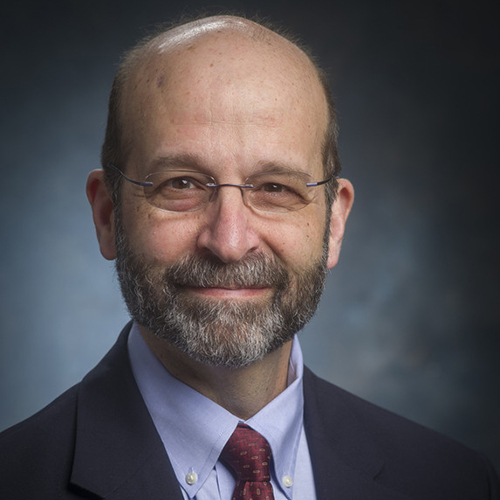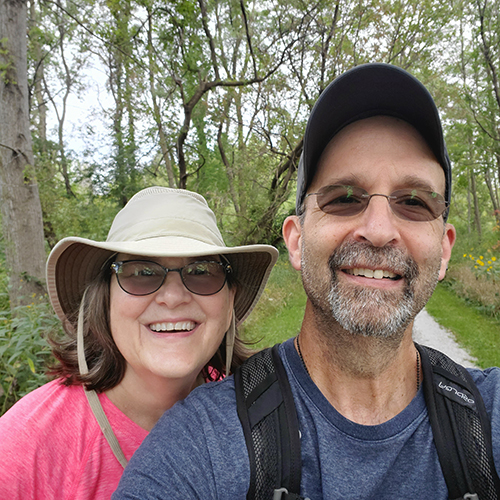 David A. Rogers, M.D., MHPE, has a transcendent vision for wellness at UAB Medicine: putting us on the map internationally as a recognized model of wellness—one that situates its people at the forefront of every decision, big or small.
David A. Rogers, M.D., MHPE, has a transcendent vision for wellness at UAB Medicine: putting us on the map internationally as a recognized model of wellness—one that situates its people at the forefront of every decision, big or small.
To do this, Rogers has made his role of chief wellness officer of the UAB Medicine Office of Wellness his entire administrative focus. Since 2018, he has worked in dual academic positions of chief wellness officer and senior associate dean of Faculty Affairs and Professional Development in the Heersink School of Medicine, while also practicing pediatric general surgery at Children's of Alabama. Now, he will transition from the senior associate dean role to devote his focus on the well-being of more than 23,000 employees at UAB Medicine.
The journey from pediatric surgery to institutional wellness
Rogers received his medical degree from the University of South Florida and completed training at the University of Tennessee, Medical College of Georgia, and St. Jude Children’s Research Hospital. Rogers says the role of pediatric general surgery has been a “wonderful career because it has offered opportunities to help people quickly and profoundly.”
Early in his training, Rogers became interested in medical education as an academic focus and began to appreciate the role of teaching at an academic medical center, specifically. This led him back to school to focus on health professions education at the University of Illinois at Chicago, where he received his master’s degree.
“I wanted to learn best practices of teaching and research. I did a fair amount of research in medical education and looked for evidence on how to do things well.” No matter his roles, this type of analytical mentality and intentionality has served Rogers well in his career—he is always looking for ways to make things better and measure results.
Before coming to UAB, Rogers applied his education and interests to surgical education programming in the Department of Surgery at the Southern Illinois University School of Medicine. For over a decade, he served in that role and practiced pediatric surgery simultaneously.
In 2012, Rogers’ wife, Laura Rogers, M.D., MPH, an internist with an NIH-funded research program, came to UAB for her dream job–a “wonderful opportunity” for her research, he says. Rogers took the open position of senior associate dean for Faculty Development in the Heersink School of Medicine dean’s office. “Initially, I focused on career and leadership development, but that role evolved and expanded to faculty affairs,” he explains.
In 2014, an annual staffing engagement survey produced results that prompted Selwyn M. Vickers, M.D., FACS, dean of the Heersink School of Medicine, and Will Ferniany, Ph.D., CEO of UAB Health System, to ask Rogers to begin wellness efforts as a part of his role in Faculty Affairs. The survey showed stress was a common factor across faculty in the school. Therefore, Vickers and Ferniany wanted to heavily concentrate on improving faculty wellness in the hospital and academic medical center—integrating it with other core objectives.
"During that time, I was hearing more about burnout and wellness, and lots of things on those topics were bubbling up in conversation," he says. "The first effort in wellness was focused on faculty and trying to reduce stress."
A few years later, Seth Landefeld, M.D., chair of the Department of Medicine and Spencer Chair in Medical Science Leadership, led a task force that asked one central question: “What do we do about employee wellness?” At that point, it was evident that wellness efforts should expand to encompass all employees of UAB Medicine. A glaring need for stress reduction, coupled with a gift from Proassurance, generated the idea of UAB Medicine’s Office of Wellness.
Rogers says the opening of the UAB Medicine Office of Wellness should be credited to LaKisha Mack, MBA, senior associate dean for Finance and Administration, and Nisha Patel, MBA, MSHA, executive director of the UAB Medicine Office of Wellness, who delegated the funds for wellness efforts and who desired to lead wellness programs, respectively.
Transitioning duties in the dean’s office
During his time as senior associate dean, Rogers has been the co-director of the Healthcare Leadership Academy, the primary approver of external activities and funding, manager of faculty grievances, manager of the Promotion, Appointment, and Tenure process within the Faculty Council, manager of the Dean's Excellence Awards, and several other responsibilities.
While he continues to co-direct the Healthcare Leadership Academy, he is a great supporter of the comprehensive leadership development efforts of Jean Ann Larson, Ed.D., chief leadership development officer. "She has greatly expanded the programs in really exciting ways," he says. Larson focuses on mentoring, professional development for women, emotional intelligence, and more.
As Rogers transitions to a full-time effort in wellness, Anupam Agarwal, M.D., executive vice dean in the Heersink School of Medicine, will take on Faculty Affairs and Faculty Development responsibilities which will include oversight of the Faculty Council and the Appointments, Promotions, and Tenure processes. In addition, Alecia Gross, Ph.D., assistant dean for Faculty Onboarding, will oversee faculty recognition awards (internal and external) and other recognition efforts. Victor Darley-Usmar, Ph.D., senior associate dean for Research Compliance and Administration, will oversee review of external activities.
Building a wellness team
The UAB Medicine Office of Wellness is young, and Rogers believes there is much room for growth. The office is made up of a wellness team, including Kathryn Meese, Ph.D., director of the UAB Center for Healthcare Management and Leadership, as well as Rogers and Patel, who each aspire to do wellness work in a scholarly and informed way. Meese helps with local impact, while also leading an effort to address fundamental questions about wellness in academic medicine. Patel directs operations and administration, successfully deploying tactics and tools that increase the well-being of UAB Medicine employees. Plus, Lauren Nassetta, M.D., is now leading the Professional Development Office and developing a vision for the team as it grows.
Listening to lead
 Drs. Laura and David RogersRogers' personal wellness philosophy significantly impacts his leadership. “We all operate out of a personal world view, a sense of values,” he says. “I enjoy helping people. I have learned that it is better to engage with people in conversation if you are trying to help them, rather than presuming to know what they need.”
Drs. Laura and David RogersRogers' personal wellness philosophy significantly impacts his leadership. “We all operate out of a personal world view, a sense of values,” he says. “I enjoy helping people. I have learned that it is better to engage with people in conversation if you are trying to help them, rather than presuming to know what they need.”
At the end of 2017, Rogers had heart surgery at UAB. “Before the surgery, I thought that I was appreciative of my teams as a surgeon because I work with all kinds of teams in my clinical work and have also done educational research in teams. But, as a patient, it was more eye-opening to see all the interactions of teams and their individual roles, particularly the nurses. It caused me to double-down on the need to focus on the entire team and valuing each member.”
His experience led him to operate out of the philosophy that, for the wellness office to effect change, it has to operate at several levels. “The stressors are different for each role…wellness is complex because tools that work for some people create stress in other people.”
Rogers says he wants to help people in UAB Medicine, regardless of their employee designation. His goal is to decrease burnout for all employees, a desire that fits into his appreciation for how bad burnout is currently and his gratitude for all employees.
Rogers stays well by practicing spirituality and living by two important commandments from his faith: loving God and loving people. Rogers says, "Our teachings make it clear that no one can claim to love God who does not love others. There is tremendous wisdom and challenge in the instruction to love others as we love ourselves.”
He also exercises by taking walks with his wife, has a daily gratitude practice, and embraces the model of naming ‘three good things’ in the morning. He pursues intellectual wellness by taking sociology classes that challenge and expand his perspectives about work.
A vision for the future: well-being for every employee
When asked about the future of UAB Medicine Office of Wellness, Rogers lights up when he answers: a focus on the entire community.
“We can’t focus on one group in the interdisciplinary model and affect major change.” We have to focus on every person, he explains.
Rogers brings observant and contemplative dynamics to wellness and is focused on measuring results. As the office grows, new information about the multiple stressors of employees will help the wellness office move forward and executive creative solutions and tools.
Plus, UAB is a hub of innovation and health care in Alabama, and is a significant driver of economic development as the largest employer in the state. UAB’s actions and objectives have a domino effect on surrounding communities. “As I think about UAB Medicine and its scope, I think it’s unbelievably important in the state of Alabama–being mindful of all campuses and all roles—to make sure everybody feels well and important, appreciated.”